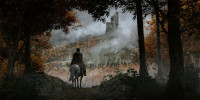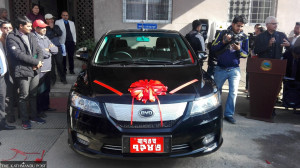Fiction Park
Corncobs and confessions
I had lied to her about having an older brother. I had done so to avoid giving her the impression that I was a stone-hearted son who didn’t love his parents. That’d mean I was incapable of l
‘’You’ve been to your village?’’
I asked.
She had not told me, but I had surmised that she did not have such a place, a place she could call her village or her home; family or ‘near-ones’. She just smiled, showing the empty spaces in her mouth where a neat row of teeth had probably once sat. Was it that she had lost one more of her few remaining teeth within a week?
She fanned the corn cobs set above the makeshift grill with folded newspaper sheets, blowing at the red-black coal as she puffed out her sunken cheek. Watching her as she did that often made me think about what the past might have been like for her. She must have been a chubby-cheeked beauty in her youth; I can see remnants of that young woman on her face when she puffs out her cheeks. How much easier it must be to gush air from a mouth that has almost no barrier in the form of teeth I wonder…
She was quite unlike herself yesterday. She seemed to be in a hurry; it seemed her usual calmness had left her. While I stood there crunching onto the corn cob she’d hurriedly grilled and slathered with chatani (Oh, I forget to tell you she now makes two types of chatani), she packed her bundle of knickknacks and got ready to leave.
“Son, there are many things left to do at home,’’ she said when I asked her why was she leaving so early. I wonder what important work might be waiting for her in her rented room. It is most probably was a little dark and damp space in a squatters’ tin roof settlement at the other side of the Bagmati the river.
It was nearly three months ago, at midday; the sun had already turned seething summer hot. It was at the very buzzing crossroads near my new room that I saw her first. She was wearing a faded dhoti which she wrapped around her like the carelessly wrapped paper covers that the cheap candies she had spread on her nanglo— among other things she had spread out before her to sell—come in. Her red blouse, which sprinkled with uneven little white dots, was too loose for her thin body but nevertheless protected her somewhat from the burning heat. Her hair was ashen grey but too thick for someone of her age. No. The flying ash from the burning wood over which the corn cobs were grilled made her blouse and her hair look as I’ve just now described them to you. She had a scar or maybe a birthmark that appeared like a little cricket bat below her ear. She smelled of smoke.
Okay, just let me be sincere. I’m not really such a curious observer. I hadn’t even looked at her with any interest originally. It was my friend, eager as she was to teach me what might have been ‘a few philosophical lessons’, who had clasped my cheeks between her thumb and index finger and forced me to look at the old women. And where did my description of her dhoti, her blouse and her hair come from? I recall them now so that you, the reader, will feel like you’re reading something ‘literary’ as to something ‘newsy or report-like’. I noticed the scar below her ear only yesterday. And anybody can tell that anybody working with smoke smells of smoke. Of course, I remember nothing of what she looked like when I saw her for the first time. If you want me to admit something, it’s that I remember the fragrance of the fingers which held me by my cheeks that day in avid detail.
“Does anyone study with the aim of dong nothing in the future?’’ I had asked my friend. Without expecting an answer I had continued, “I don’t want to be anyone in the future; I simply want to wander around doing absolutely nothing. As for taking care of my parents when they’re older, I don’t have to worry about that. My older brother will do it.’’
I had lied to her about having an older brother. I had done so to avoid giving her the impression that I was a stone-hearted son who didn’t love his parents. That’d mean I was incapable of loving anyone, not even her. She had looked at me with teary eyes (or had her eyes only seemed teary because of the blazing sun, I couldn’t tell) and said, “You have to be someone, if only to support yourself, or even be able to wander in this world.’’
I had deduced, then and there, that she had no interest whatsoever in me. Couldn’t she have said, “And what will happen of me?’’ Maybe she’s a girl of honour, one who doesn’t want to depend on anyone else. Maybe she’s a brain that doesn’t know to function properly when required. She rattled a few more smart sounding philosophical instructions before making me look at the old women across the street. Those of you who might be envying me for having such a caring, smart, even beautiful a girlfriend, please let me relieve you. If you call her smart, I, without hesitation, wish to call her crap, and you’ve never seen her to call her beautiful. So you have to believe me when I say that even by my standards, she is not a beauty. And let me tell you that I’ve overheard my classmates many times, declaring unanimously, that my face resembles that of an amusing animal (I still feel somewhat embarrassment to name the animal) more than that of a man. So believe me when I say she is not beautiful.
Hey, where’s the old woman? She ought to be the main subject.
She would set up shop everyday—no matter the season or weather conditions— exactly at the same spot in the corner beside the electricity pole. I’d many a times felt an urge to ask her, “What do you do with the money you earn, aamai?’’ but had refrained from asking it because I thought it’d seem too nosy. When anyone complimented the sweetness of her corn, I saw a sense of pride beaming from all those wrinkles. Sometimes she’d tease me and get the girls who’d gathered in front of the panipuri wallah’s, next to her station burst out into noisy laughter for reasons I couldn’t understand.
Today, when I was on my way to college, I saw her sauntering a few paces ahead of me. I caught up with her and asked where she was going. “To buy medicine,” she said handing over a doctor’s prescription note that she had been clutching tightly in her hand to me.
“What happened? Are you sick?”
“No,” she said, and showed me an empty leaf of medical tablets. She had already been using the medicine. I glanced at her. She probably read the question on my face and smilingly answered, “For my youngest daughter.” Then she must’ve lied to me once when she told me that her husband had left her just few months after marrying and that she had no children, I contemplated.
Now, I am in front of her again, dragged by the pleasant aroma of grilled corn in the evening. “How’s your daughter,’’ I ask. She nods her head and gestures to say that she’s fine. Fuelled more by a desire to make her remember that she had once laughingly lied to me than by curiosity, I ask her, “Where does she live?”
“Where would she live? With me,’’ she says seriously and as if some secret has unwittingly slipped out of her mouth. She glances at me and bursts into a cackle like she often does when she jokes. I ask more questions, like a prying journalist, and she answered them in terse sentences. I think this is partly because she is not interested in taking to me about her daughter and partly because her mouth is too busy blowing out air.
She finally confesses. “I have three young girls who live with me. They are women who’ve faced difficulties in life; unfortunate circumstances they would wish upon no other. Two of them will be opening a tailors shop soon,” she tells me. I am baffled, she continues. “The youngest of them fell sick last week. That is why I took a break from work. I have a family of four now,” she says and smiles.
I feel like I want to withdraw my accusation now. The girl about whom I talked to you earlier is not crap. You can imagine her to be as beautiful as you want.




 26.43°C Kathmandu
26.43°C Kathmandu












